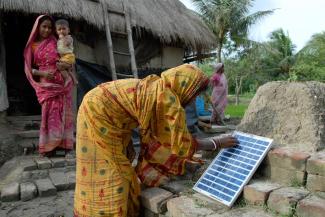Development finance
Not much momentum for change
 Böthling/Photography
“Climate finance must be afforded on top of ODA and consist of fresh money”. A micro-finance based solar-home system in West Bengal.
Böthling/Photography
“Climate finance must be afforded on top of ODA and consist of fresh money”. A micro-finance based solar-home system in West Bengal.
The third UN conference on Financing for Development will be held in Addis Ababa in July. It must not just aspire to mobilise funds, but just as much to use them in ways that serve SDG achievement. It must promote the paradigm shift needed in international development affairs to achieve sustainable development.
Moreover, humanity needs agreements on implementing decisions, and all parties involved – governments as well as private-sector actors – must be made accountable. The agreements must be more than the vague declarations of intent that governments like to sign. This time, binding commitments are needed concerning crucial issues:
- The mother of all declarations of intent is donor nations’ promise to spend 0.7 % of gross national income (GNI) on official development assistance (ODA). So first of all, Addis must deliver a time frame by which this pledge will finally be fulfilled. Otherwise the donor governments will be gambling their credibility.
- Second, the trend of less and less ODA flowing to least-developed countries (LDCs) must be reversed. A reasonable target would be for donors to spend 0.15 % to 0.2 % of GNI on ODA to LDCs.
- Third, climate finance must be afforded on top of ODA. It must consist of fresh money.
- Fourth, it would be a big step forward if emerging markets were to participate in the ODA system.
- Finally, it would be good to return to the principles of aid effectiveness that were defined years ago in Paris. Applying them would boost the impacts of aid.
Looking beyond aid, it is necessary for developing countries to generate more domestic government revenues, for instance through taxes. Accordingly, tax revenues will be high on the agenda in Addis. Tax evasion and capital flight must be fought more effectively. The advanced nations should contribute to achieving these goals by supporting the development of tax systems in developing countries and by acting to stem illicit financial flows internationally.
Another item on the agenda in Addis will be how to create a good business climate to attract foreign investors. It must not be neglected, however, that foreign direct investment in itself does not necessarily contribute to sustainable development. To do so, companies’ activities must be in line with social and environmental standards, lead to more tax revenues and fit national development plans.
Ahead of Addis, after several rounds of preparatory talks, the proposals of advanced nations, developing countries and civil-society organisations still seem worlds apart. In this context, any agreement to assess the financial sector according to its contribution to SDG achievement would be a success. It would equally make sense to introduce new measures to stabilise financial markets, regulate shadow banking and admit innovative financial products. In spite of opposition from Washington, moreover, reforming the International Monetary Fund (IMF) would matter a lot in terms of better involving developing countries in the decision-making of international financial institutions.
A short glance at the draft of the final declaration that has been prepared for Addis does not inspire much hope however. To judge by it, donor governments are still shying away from their responsibilities, and public tasks are being entrusted into private hands. Unfortunately, it does not look as if Addis will add momentum to a transformative agenda that can be paraphrased with buzzwords such as social justice, reduced inequality, green technology, enforcement of human rights and protection of biodiversity.
Ulrich Post heads the policy division at Welthungerhilfe, a German civil-society organisation.
ulrich.post@welthungerhilfe.de
http://www.welthungerhilfe.de

